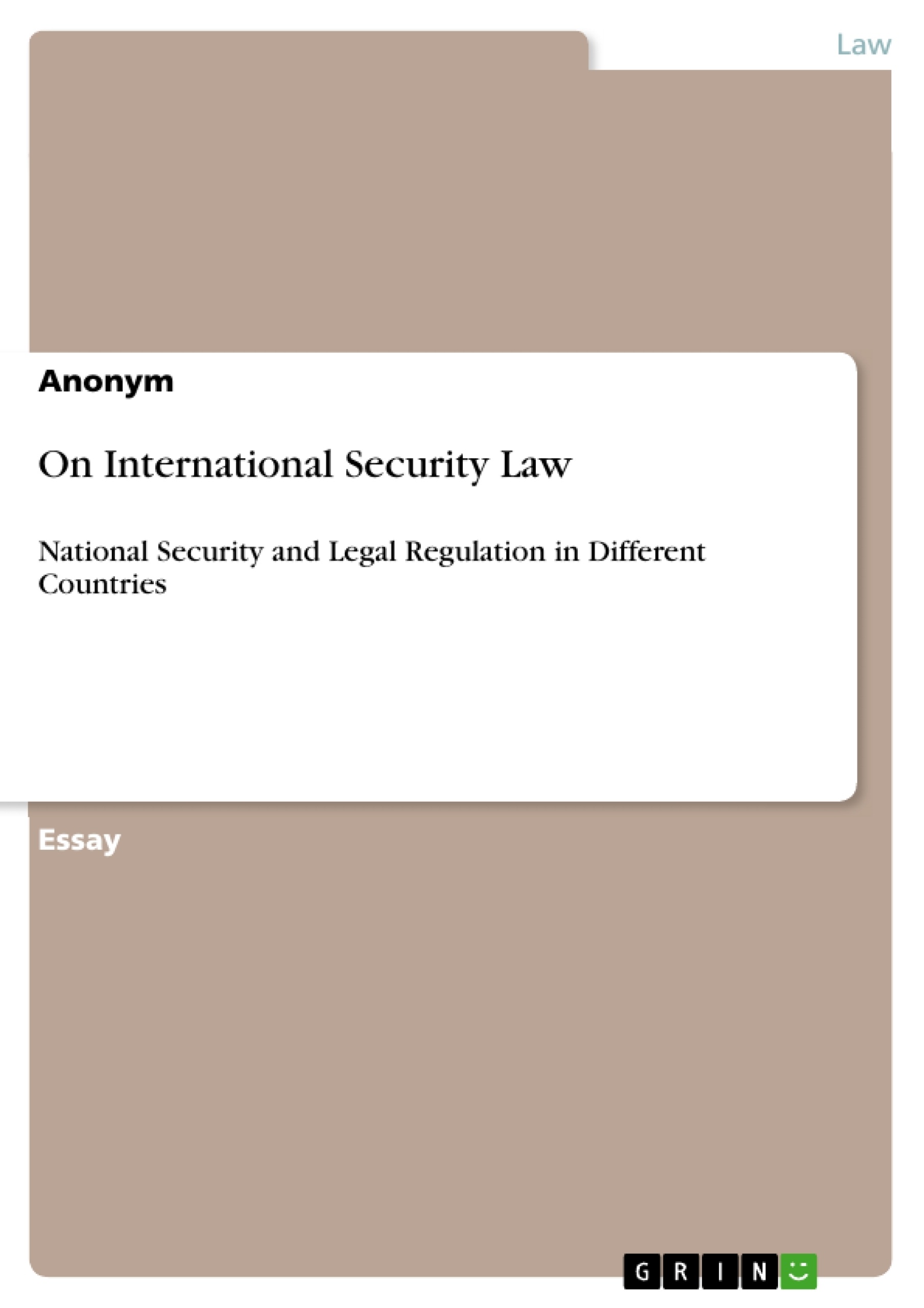The present work focuses on the relationship between national security law in different countries and its legal regulation. Ensuring national security requires a special approach to the legal regulation of this sphere. It seems that the key here is the concept of legal and, most of all, the administrative-legal regime, through which the proper degree of ordering of the security system itself and its components, as well as individual processes in the field of ensuring the security of individuals, society and the state, is actually achieved. The relationship between the elements of the triad "person-society-state," which is fundamental for defining security, undergoes an inversion when moving from the very concept of security to ensuring it. If in the concept of security, the priority belongs to the individual, then society and, finally, the state, then, in ensuring security, everything looks the other way.
There is a close interdependence between development and security, since these are the two most important functions of society. These concepts have differences, since, in fact, they have the opposite direction, but they are equal in their activities. At the same time, development is primary and safety is secondary, but, namely, this ensures development and protects against threats. The secondary nature of security does not reduce its role in objective reality.
The importance of security is explained by the fact that it actively influences the formation of directions of development in a particular sphere of life activity. Naturally, the more developed a country is in different directions, the greater is its capacity to ensure its security. Failures in development lead to a decrease in the level of security, exacerbation of old threats, and the emergence of qualitatively new ones, and vice versa, success in development expands the possibilities for ensuring security.
Table of Contents
- Ensuring National Security
- Development and Security
- Legal System of Ensuring National Security
- Foreign Intelligence Surveillance Act (FISA)
- National Security Act
- National Security in Russia
- Legal System for Ensuring Russia's National Security
- Comparison of Security Concepts
Objectives and Key Themes
This text delves into the complex relationship between legal frameworks and national security, highlighting the role of legal instruments in ensuring national security. It explores the distinct approaches of the United States and Russia in defining and achieving security, while analyzing legal frameworks, key legislation, and relevant case studies.
- Legal frameworks for ensuring national security
- Comparative analysis of security concepts in the US and Russia
- Role of legislation in defining and achieving national security
- The impact of historical events and contemporary threats on security strategies
- Analysis of specific legal instruments like FISA and the National Security Act
Chapter Summaries
- Ensuring National Security: This chapter introduces the concept of national security and emphasizes the importance of legal regulation in this sphere. It delves into the interplay between individual, society, and the state in safeguarding national security, outlining the state's crucial role in coordinating efforts to overcome security threats.
- Development and Security: This chapter explores the intertwined nature of development and security, highlighting their inherent differences and complementary roles in societal functioning. It emphasizes the primary importance of development and the secondary role of security in ensuring sustained progress and protection from threats.
- Legal System of Ensuring National Security: This chapter examines the legal framework underpinning national security, underscoring the unifying role of law in shaping and solidifying the security system. It explores the diverse functions of law in maintaining stability, unity, and dynamism within the security landscape.
- Foreign Intelligence Surveillance Act (FISA): This chapter delves into the FISA, a US legal framework governing the collection of information by the National Security Agency and the FBI. It outlines the purpose, mechanisms, and evolution of FISA, emphasizing its crucial role in protecting national security through intelligence gathering and surveillance activities.
- National Security Act: This chapter examines the historical significance of the National Security Act, tracing its impact on shaping the concept of national security in the United States and beyond. It highlights the Act's role in introducing the term "national security" into American legal and political discourse.
- National Security in Russia: This chapter focuses on Russia's approach to national security, exploring the framework outlined in the National Security Strategy of the Russian Federation. It emphasizes the Strategy's role as a guiding document for national security planning and its influence on coordinating the efforts of various stakeholders.
- Legal System for Ensuring Russia's National Security: This chapter examines the legal system of Russia, detailing the legislative framework for national security at various levels. It highlights the importance of laws like the Foreign Intelligence Act and the Security Law 2010 in ensuring national security and addressing contemporary challenges.
Keywords
National Security, Legal Regulation, Security Threats, Legal Frameworks, Development, Security, FISA, National Security Act, Intelligence Gathering, Surveillance, Russia, National Security Strategy, Comparative Analysis, Security Concepts, US Law, Russian Law.
Frequently Asked Questions
How are development and security related?
Development and security are interdependent; while development is primary for progress, security is secondary but necessary to protect that development from threats.
What is the "person-society-state" triad in security law?
In the concept of security, priority belongs to the individual, then society, and finally the state. However, in ensuring security, the state often takes the lead role.
What is the purpose of the Foreign Intelligence Surveillance Act (FISA)?
FISA is a US legal framework that governs how the NSA and FBI collect foreign intelligence information through surveillance to protect national security.
What did the National Security Act introduce to the US?
It was a landmark piece of legislation that introduced the term "national security" into American legal and political discourse and reshaped the security landscape.
How does Russia define its national security strategy?
Russia uses a formal "National Security Strategy" as a guiding document to coordinate the efforts of various stakeholders in planning and safeguarding the state.
- Citation du texte
- Anonym (Auteur), 2018, On International Security Law, Munich, GRIN Verlag, https://www.grin.com/document/458018



